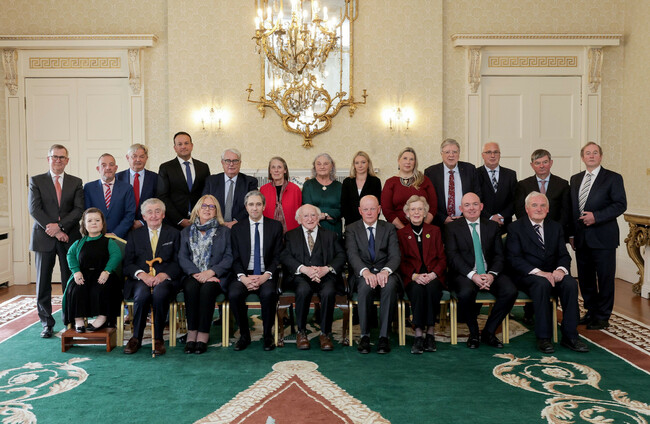The Bill will preclude the Defence Forces from publicly questioning or commenting on government defence policy.
President Michael D Higgins will meet with the Council of State this afternoon. Alamy Stock Photo
THE PRESIDENT WILL meet with the Council of State this afternoon to consider the constitutionality of the Defence (Amendment) Bill 2024, which could preclude the Defence Forces from publicly questioning or commenting on government defence policy.
PDFORRA, which represents rank and file members across the Irish Air Corps, the Naval Service and Army along with the Representative Association of Commissioned Officers (RACO) have previously denounced the Bill.
In February, RACO told the Joint Oireachtas Committee on Foreign Affairs and Defence that it believes the amendment is “draconian”.
The representative bodies have taken issue with the makeup of the External Oversight Body as its membership includes the Secretary General of the Department of Defence.
At the meeting in Áras an Uachtaráin today, the question President Michael D Higgins will ask the Council of State to consider is:
“Whether the Defence (Amendment) Bill 2024 should be referred by the President to the Supreme Court for a decision on the question as to whether the Bill or any specified provision or provisions thereof are repugnant to the Constitution or to any provision thereof.”
The particular line in the Amendment, that the representative bodies have taken issue with, was highlighted by RACO in February.
It states that members of the Defence Forces “shall not question or express an opinion on the merits of any policy of the Government or a Minister of the Government or on the merits of the objectives of such policy”.
PDFORRA told the Oireachtas earlier this year that the organisation and its members have “always accepted the need for political impartiality; however, this provision limits the ability of members to speak or give an opinion to any political organisation, society or grouping”.
The representative body highlighted how, under the proposals, members of the Defence Forces could face military charges for speaking out when dissatisfied with the nation’s health service or attending a public demonstration.
“Soldiers are citizens in uniform and should be vested with the rights and entitlement of normal citizens while not in uniform,” they argued.
Speaking on RTÉ’s Morning Ireland programme, Minister of State for Defence Jennifer Carroll MacNeill said the Bill will enable RACO and PDFORRA to join the Irish Congress of Trade Unions (ICTU) as associate members.
“That’s a big step forward that recognises the representative groups and gives them a larger, weightier voice in different ways,” she said.
“But what we’re still doing is maintaining the existing, blanket apolitical nature of the Defence Forces and making it very clear that that should persist and that that’s a really important part of our defence forces.”
She said the Government is trying to enhance circumstances where terms and conditions can be improved.
“What we’re trying to say though, is that a member of Defence Forces in uniform cannot participate in a protest. But if you’re not in uniform, of course, you can.”
Asked what would happen if a soldier were to speak out against pay and conditions, Carroll MacNeill said “it’s not appropriate that they do that” but that they would not lose their job.
“We have structures for the representative groups to be engaged in the whole conversation around terms and conditions, which we are actively enhancing. We are also enabling them to become associate memberships of trade unions, which is for the first time a step forward and an enhancement of that platform and of that ability,” she said.
She said the Government is also increasing pay for new members of the Defence Forces and improving health benefits and upgrading facilities at naval bases.
“We are doing all of this to make the Defense Forces a more attractive place to be. But it is also important that the Defence Forces, like the judiciary, remain broadly apolitical.”
The Journal covered this issue in July last year when Daniel Murphy, who is the designated Adjudicator under the Conciliation and Arbitration Scheme for the Defence Forces, accused the Department of Defence of operating “secret laws”.
The accusation was included in a Department report published last year. He further accused the Department for having a “silly and facetious approach” to membership of representative bodies by military personnel.
Includes reporting by Niall O’Connor.


